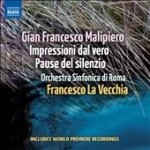It’s always difficult to speak authoritatively about performances of unfamiliar music, but these works are so strange, so beautiful, and so remarkable that criticism is disarmed. Impressioni dal vero (“Impressions from life”) consists of three, three-movement suites of strikingly colored, harmonically arresting, melodious music. The titles give some impression of these atmospheric pieces: Dialogue of Bells, The Cypresses and the Wind, The Woodpecker, and Festival in the Valley of Hell. “Haunting” is perhaps the best term to describe the music–it gets under your skin, and doesn’t sound like anyone else.
Pause del silenzio (“Breaks in silence”) consists of two suites, one of five movements and one consisting of seven brief episodes played continuously. There’s an improvisatory quality to these pieces that makes them completely unpredictable, and yet somehow they work well together. Okay, let’s forget about describing the impossible and turn instead to performances that sound remarkably confident and assured. The orchestra plays very well, conductor Francesco La Vecchia (as in his Casella series) leads with a masterly sense of pacing, and the sonics are excellent. This is just wonderful.
































